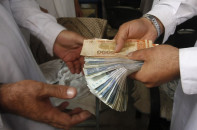FBR misses four-month tax target by Rs82 billion
Extension also given to file income tax returns after only 317,000 people completed duty

Extension also given to file income tax returns after only 317,000 people completed duty. PHOTO: Reuters
It also had to extend the last date for filing income tax returns by 15 days after only 317,000 people filed their returns for tax year 2016. In tax year 2015, as many as 1.074 million people had filed returns after government gave half a dozen extensions.
2015-16 fiscal review: FBR nails down Rs3.1tr tax target
The original date for filing returns is September 30 every year, which the government has been extending due to multiple reasons including technological hiccups and delay in finalising the return forms.
The FBR provisionally collected Rs860 billion during the July-October period of this fiscal year, registering just 4.4% growth over the collection of the same period of the previous fiscal year, according to FBR officials. In absolute terms, the collection was a mere Rs36 billion higher than the comparative period.
The FBR needed 14% growth rate over its last year’s collection of Rs824 billion to hit the four-month target.
Against the target of Rs942 billion, the FBR ended up collecting just Rs860 billion. The gap in the first three months was Rs60 billion, which has now further widened, indicating that the FBR will not be able to achieve its annual target until drastic steps are taken.
For the current fiscal year, the parliament has approved a Rs3.621-trillion annual target and the FBR was aiming to collect about 26% of it in the first four months.
Despite measures
The shortfall has widened despite the government’s claim that the FBR would collect an extra Rs100 billion during the current fiscal year due to recent changes in property valuation rates. The Rs100 billion was not part of the budget estimates.
The government’s decision to keep the petroleum products prices unchanged affected the FBR’s revenue collection, said Finance Minister Ishaq Dar on Monday. He said since March petroleum prices in international markets increased over 24% which the government did not pass on to the end consumers.
The FBR officials said that the government’s decision to grant zero-rating regime to five export oriented sectors also affected revenue collection. This is also tantamount to admitting that collection in the past was inflated by blocking genuine refunds of taxpayers.
Taking over Rs250 billion advances in the last fiscal year to claim achieving previous year’s Rs3.104 trillion target was the main reason behind continuous shortfall in collection, according to sources.
Refund payments
Dar also announced that Rs25 billion sales tax refunds would be paid next week. The decision was taken after Prime Minister Nawaz Sharif announced that refunds would be cleared in cases where Refund Payment Orders (RPOs) were issued up to June 30, 2016, said Dar.
He said that payments of these refunds will be made to the recipients within the next seven days. Dar said that, for the first time, these refunds shall be paid directly into the accounts of the refund recipients, in order to save them from the inconvenience of depositing and clearing cheques.
The minister said that State Bank of Pakistan was making the necessary arrangements in this regard. Finance Minister said that all complaints in delays or difficulty in obtaining these sales tax refunds can be addressed to FBR focal person at strefund@fbr.gov.pk.
Dissatisfied govt may shuffle second-tier of FBR
To a question, the Minister said that he decided on Sunday that the government would not use the Special Purpose Vehicle (SPV) to pay sales tax refunds. The Rs25 billion refunds will be paid out of Federal Divisible Pool, he added.
The minister said that the government would not dissolve the SPV, as it was just a paper company.
Earlier, the government had decided to borrow money from banks to pay over Rs200 billion tax refunds. However, its plan met opposition from the International Monetary Fund and other stakeholders who opposed the idea to retire funds by borrowing money.
Published in The Express Tribune, November 1st, 2016.
Like Business on Facebook, follow @TribuneBiz on Twitter to stay informed and join in the conversation.



















COMMENTS
Comments are moderated and generally will be posted if they are on-topic and not abusive.
For more information, please see our Comments FAQ